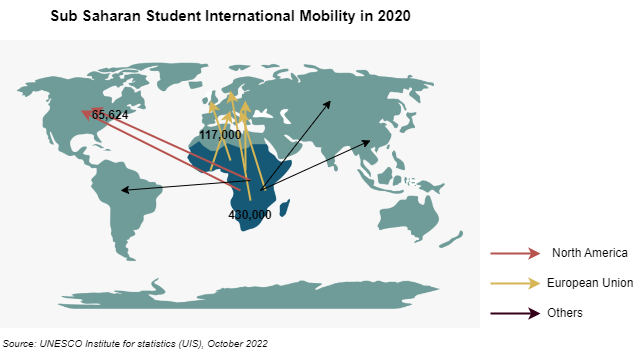Empowering African Graduates: Unveiling The Realities And Necessity For Professional Skills

Introduction:
The impactful quotes of Malcom X and Nelson Mandela, stating that “Education is the passport to the future, for tomorrow belongs to those who prepare for it today” and “Education is the most powerful weapon which you can use to change the world,” can be met with some skepticism by graduates worldwide, particularly Sub-Sahara African graduates. This skepticism stems from the evident challenges they face in transitioning from education to employment, which may support the audaciousness of this claim.
Exploring the Drive for Education:
In our previous article titled “Empowering African Graduates: The Path to Successful Transitions and Career Growth,” we recognize that African youths primarily pursue education to acquire the knowledge and skills necessary for promising employment opportunities. In 2020, approximately 430,000 Sub-Saharan youths ventured beyond their home countries for further education, with popular destinations being the European Union (27%) and North America (15%). Nigeria led in terms of country mobility rates (17%), followed by Cameroon (6%), and 4% for Zimbabwe, Ghana, Ivory Coast, and Senegal (UIS, October 2022). While many of these youths aspire to secure professional jobs abroad after completing their degrees, the reality often presents significant challenges.
The Challenge of Work Visas:
Transitioning from student to professional life as an international student necessitates obtaining a work visa, which relies on a company’s willingness to sponsor it. Unfortunately, most companies are hesitant to undertake this process due to immigration policies and work permit restrictions. For instance, consider the case of Cameroon. Since 2019, Cameroonian youths have been granted an average of over 1000 student visas annually, positioning Cameroon among the top five countries with international students in Belgium. However, the records of work visas (single permits) issued by the Belgian immigration office do not include Cameroon in the top five countries granted work visas. In fact, the numbers are so insignificant that Cameroon is aggregated under the category of “others” (Immigration Office Belgium, 2021). This raises the pressing question of what steps these sub-Saharan graduates should take next. Based on personal observations, many opt to pursue additional degrees, accumulating academic qualifications without addressing the core issue.
Graffi Lewa’s Perspective:
At Graffi Lewa, our mission is not only to address this issue from a non-political standpoint but also to raise awareness that traditional university degrees alone are no longer sufficient to make sub-Saharan African graduates competitive in today’s job market. With the rapid evolution of the job market, employers are now seeking candidates equipped with the essential professional skills and experience that add value to their companies. Graffi Lewa serves as a dedicated learning platform, empowering African youths worldwide with the necessary professional skills and work experience required to thrive in today’s ever-evolving job market. Our unique approach involves tapping into the experience of African professionals already established in the job market to provide training geared towards obtaining internationally recognized certifications that appeal to employers.
Share Your Perspective:
Addressing this challenge requires collective effort; it is a problem that goes beyond Graffi Lewa alone. We believe that practical solutions can only be achieved through joint endeavors. We invite you to take a moment and participate in our quick survey, contributing to the conversation and helping shape the way forward.
Link to survey: https://forms.office.com/e/EFh1v6uD05
Graffliand
Sunday 2nd July 2023.